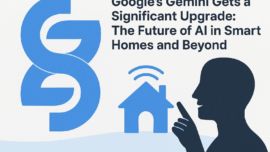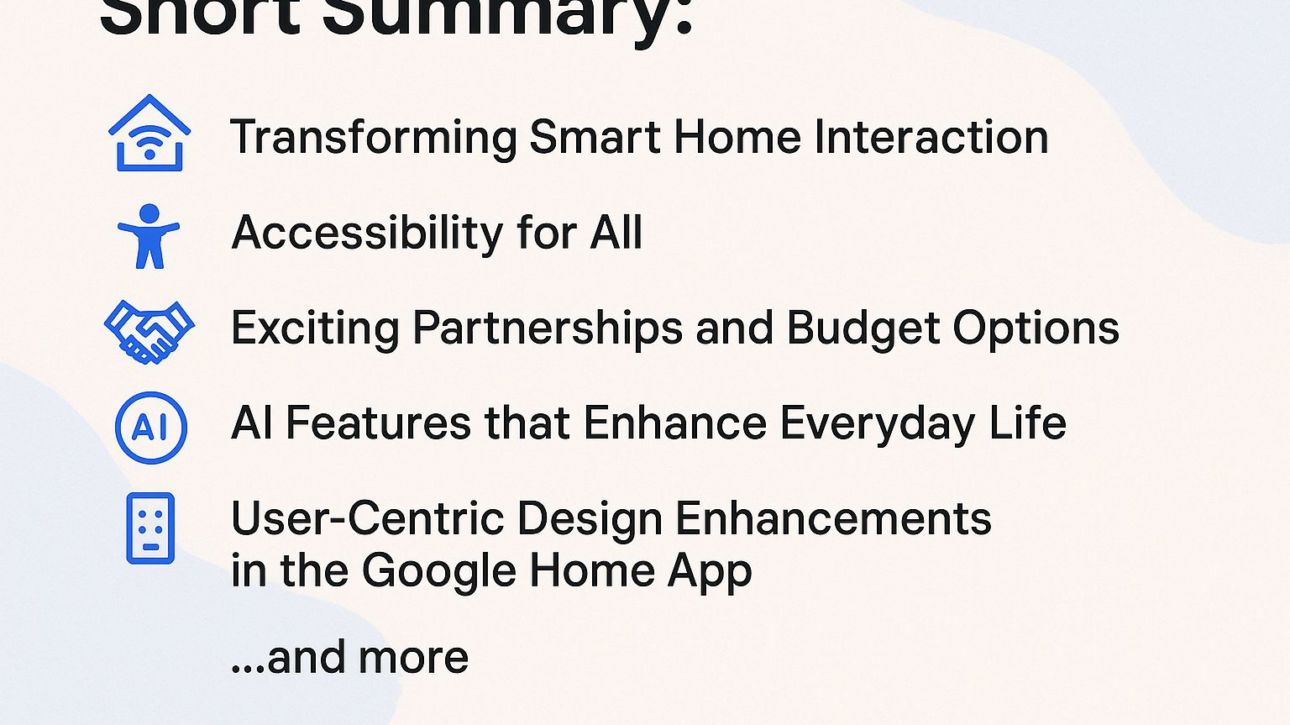Google has significantly upgraded its AI capabilities with the introduction of Gemini, elevating its smart home offerings and positioning itself competitively in the market just after Amazon’s AI device launch.
Short Summary:
- Gemini AI replaces the traditional Google Assistant, enabling more natural interactions with smart home devices.
- New Nest devices, including cameras and doorbells, showcase advanced AI features while maintaining compatibility with existing hardware.
- Google’s partnership with Walmart aims to provide budget-friendly options, expanding accessibility to smart home technology.
In a move that signifies the evolution of smart home technology, Google has unveiled a host of upgrades centered around its innovative artificial intelligence platform, Gemini. This launch marks a pivotal moment, particularly as it follows closely on Amazon’s introduction of AI-infused Echo devices, reinforcing the competitive landscape of AI-assisted home automation. With Gemini, Google aims to create a more engaging and seamless experience for users, transforming how they interact with their smart homes.
“We want to build flagship hardware in categories where we see vast potential to showcase innovation and expand what’s feasible with Gemini,” stated Anish Kattukaran, Chief Product Officer at Google Home and Nest. “But we also believe that Gemini should not be limited to just one device or price point.” This ethos encapsulates Google’s strategy, positioning Gemini as a versatile AI platform designed to work across diverse devices, thus making it accessible for a broader audience.
As part of the launch, Google revealed a revamped lineup of Nest devices, including the Nest Cam Outdoor, Nest Cam Indoor, and a new Nest Doorbell. These devices leverage the capabilities of Gemini to provide rich, intelligent experiences that go beyond simple voice commands.
Transforming Smart Home Interaction
Introducing features like enhanced voice recognition and context awareness, Gemini redefines how users interact with their smart devices. For example, if a user asks, “Play that song from that movie with Ben Affleck where he’s on a rocket,” Gemini can accurately identify the song “I Don’t Want to Miss a Thing” from the film Armageddon. As users become accustomed to Gemini’s capabilities, they can request follow-up questions or additional tasks — a monumental leap toward a more conversational AI.
“I’m optimistic about this experience becoming the default interaction style for users,” expressed Kattukaran. “This is the groundwork for a home environment that understands and reacts to its inhabitants, streamlining everyday tasks.”
Accessibility for All
The clarity of Google’s vision is seen in its approach to making Gemini available on existing devices, thus avoiding the immediate need for consumers to invest in new models. Google’s ecosystem currently supports over 800 million devices, connected through the Google Home
Cloud-to-Cloud APIs and the Matter smart home standard.
Gemini AI is set to enhance not just new devices but also existing HD cameras, doorbells, and speakers, providing users with a more robust experience without the burden of upgrading. This strategy reflects Google’s commitment to maximizing the potential of its established user base while preparing the ground for future hardware releases.
Exciting Partnerships and Budget Options
In an effort to democratize access to smart home technology, Google has partnered with Walmart, launching two new budget-friendly smart home products under the onn brand: the onn Indoor Camera priced at $22.96 and the onn Video Doorbell at $49.86. Offering these devices at a low price point allows Google to broaden its market reach, making the AI-powered home accessible to more users.
This collaboration opens the door to smarter homes without the hefty price tag, dramatically lowering entry barriers and appealing to a demographic that might hesitate to invest in more expensive smart devices.
AI Features that Enhance Everyday Life
The core of Gemini’s allure lies in its AI-driven functionalities that enhance everyday life. These advancements are not just limited to smart commands; they enable users to engage with their homes more creatively and effectively. For example, you could command your smart device, “I’m boiling eggs; can you set a timer?” and Gemini will offer options for hard or soft-boiled eggs before it proceeds to set the timer.
Equipped with capabilities to manage calendars, shopping lists, and automated tasks, Gemini also introduces features like Ask Home, where users can inquire about specific home settings or safety measures. This not only streamlines how users manage multiple devices but provides them personalized insights to ensure optimal home automation.
“A truly helpful home is one where all devices work together, regardless of the manufacturer,” the company emphasized in its announcement, reiterating the importance of interoperability within the smart device ecosystem.
User-Centric Design Enhancements in the Google Home App
The Google Home app has undergone significant redesign to complement the new AI capabilities, focusing on speed, reliability, and an intuitive interface. The app is now reportedly 70% faster on select Android devices, boasting a reduction in crashes by nearly 80%.
This revamped application serves as the hub for controlling connected devices and houses Gemini’s functionalities, offering users an engaging interface to interact with their smart home environment. Key features include a unified view of alerts, easy access to smart home activity, and customizable settings for device scheduling.
To enhance the user experience further, the app integrates AI Descriptions, which provide in-depth narratives on observed events, enhancing user understanding of their home activities. For instance, a camera might notify users with detailed alerts like, “A delivery driver is at your door,” rather than a vague “motion detected” message.
Launching Upcoming Innovations
Looking ahead, Google is prepared to launch additional innovations, including a new Google Home Speaker that will function as a central hub for managing smart home devices, all while embedding Gemini’s intelligence. Expected to release in Spring 2026 at a price of $99, this speaker will feature a glowing light ring indicating when Gemini is active, providing a more communicative experience.
The company’s long-term strategy appears to focus on not just upgrading devices but also enhancing how those devices interact with users, paving the way for a truly responsive, connected environment.
The Future of Smart Homes with Gemini
As we delve deeper into the era of AI integration in our homes, Google’s latest offerings indicate a careful balancing act between creating high-end experiences while ensuring inclusivity through budget-friendly options. “We’re embarking on a journey where homes can seamlessly understand, interact, and cater to the needs of their inhabitants, simplifying lives in myriad ways,” stated Kattukaran.
This development is more than just about gadgets; it represents a collective effort to redefine lifestyle experiences through technology, inviting users to embrace smarter habits and automation. Google’s clear commitment to innovation, market accessibility, and user experience positions Gemini as a foundational pillar for the future of home automation. Future collaborations and advancements will undoubtedly shape how we perceive and interact with the very spaces we inhabit.
In conclusion, as the smart home landscape continues to evolve, Google’s strategies around Gemini reaffirm their ambition to lead this technological frontier. Whether through premium Nest products or budget alternatives, the company is poised to make notable strides in how we embrace technology at home. For more information on how to elevate your content strategy using AI, visit Autoblogging.ai, where we combine innovative AI insights with SEO optimization for an engaging user experience.
Do you need SEO Optimized AI Articles?
Autoblogging.ai is built by SEOs, for SEOs!
Get 30 article credits!



